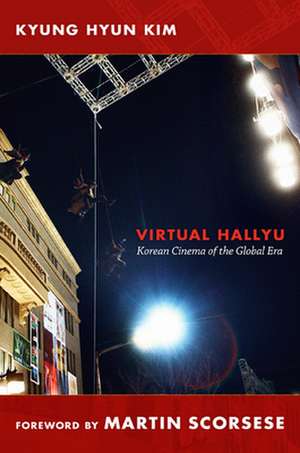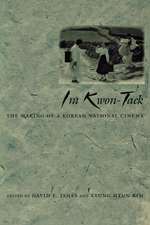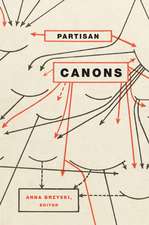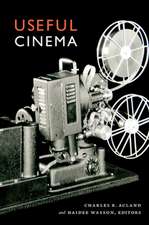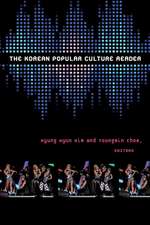Virtual Hallyu – Korean Cinema of the Global Era
Autor Kyung Hyun Kimen Limba Engleză Paperback – 9 oct 2011
Preț: 260.41 lei
Nou
Puncte Express: 391
Preț estimativ în valută:
49.83€ • 52.03$ • 41.15£
49.83€ • 52.03$ • 41.15£
Carte tipărită la comandă
Livrare economică 15-29 aprilie
Preluare comenzi: 021 569.72.76
Specificații
ISBN-13: 9780822351016
ISBN-10: 0822351013
Pagini: 280
Ilustrații: 57 photographs, 3 tables, 6 figures
Dimensiuni: 156 x 232 x 21 mm
Greutate: 0.36 kg
Ediția:New.
Editura: MD – Duke University Press
ISBN-10: 0822351013
Pagini: 280
Ilustrații: 57 photographs, 3 tables, 6 figures
Dimensiuni: 156 x 232 x 21 mm
Greutate: 0.36 kg
Ediția:New.
Editura: MD – Duke University Press
Cuprins
PrefaceIntroduction: Hallyus Virtuality1. Virtual Landscapes: Sopyonje, The Power of Kangwon Province, and The Host2. Viral Colony: Spring of Korean Peninsula and Epitaph3. Virtual Dictatorship: The Presidents Barber and The Presidents Last Bang4. Mea Culpa: Reading the North Korean as an Ethnic Other5. Hong Sang-soos Death, Eroticism, and Virtual Nationalism6. Virtual Trauma: Lee Chang-dongs Oasis and Secret Sunshine7. Park Chan-wooks Unknowable Oldboy8. The End of History, the Beginning of Historical Films: Koreas New SagukNotes; Bibliography; Index
Recenzii
A highly informative and imaginative account of the multifaceted powers of virtuality that make up the unique phenomenon of Korean cinema in the early twenty-first century.--Rey Chow, author of Sentimental Fabulations, Contemporary Chinese Films
Coming close on the heels of The Remasculinization of Korean Cinema, his seminal analysis of the psychic and political foundations of the New Korean Cinema of the 1990s, Kyung Hyun Kim has now produced the essential text on hallyu, the phase of Korean cinema and related forms of popular culture that became a global sensation in the first decade of the new millennium. Bringing key Deleuzian concepts into focus with sensitive and nuanced readings of international blockbusters including The Host (Bong Joon-ho) and Oldboy (Park Chan-wook) as well as the work of notable art-cinema auteurs, Kim establishes himself as not just the most important Anglophone critic of South Korean cinema, but a key figure in film and cultural studies generally. David E. James, author of The Most Typical Avant-Garde: History and Geography of Minor Cinemas in Los Angeles
Kyung Hyun Kim seems well placed to write an interesting study of contemporary Korean cinema. The UC Irvine professor has already written one book on the subject, The Remasculinization of Korean Cinema (Duke University Press, 2004), produced a number of films (including Im Sang-soos recent high profile remake of The Housemaid[2010]), and is impressively connected within the Korean film industry. - Mike Walsh, Screening the Past, July 2012
"A highly informative and imaginative account of the multifaceted powers of virtuality that make up the unique phenomenon of Korean cinema in the early twenty-first century."--Rey Chow, author of Sentimental Fabulations, Contemporary Chinese Films "Coming close on the heels of The Remasculinization of Korean Cinema, his seminal analysis of the psychic and political foundations of the New Korean Cinema of the 1990s, Kyung Hyun Kim has now produced the essential text on hallyu, the phase of Korean cinema and related forms of popular culture that became a global sensation in the first decade of the new millennium. Bringing key Deleuzian concepts into focus with sensitive and nuanced readings of international blockbusters including The Host (Bong Joon-ho) and Oldboy (Park Chan-wook) as well as the work of notable art-cinema auteurs, Kim establishes himself as not just the most important Anglophone critic of South Korean cinema, but a key figure in film and cultural studies generally." David E. James, author of The Most Typical Avant-Garde: History and Geography of Minor Cinemas in Los Angeles "Kyung Hyun Kim seems well placed to write an interesting study of contemporary Korean cinema. The UC Irvine professor has already written one book on the subject, The Remasculinization of Korean Cinema (Duke University Press, 2004), produced a number of films (including Im Sang-soo's recent high profile remake of The Housemaid[2010]), and is impressively connected within the Korean film industry." - Mike Walsh, Screening the Past, July 2012
Coming close on the heels of The Remasculinization of Korean Cinema, his seminal analysis of the psychic and political foundations of the New Korean Cinema of the 1990s, Kyung Hyun Kim has now produced the essential text on hallyu, the phase of Korean cinema and related forms of popular culture that became a global sensation in the first decade of the new millennium. Bringing key Deleuzian concepts into focus with sensitive and nuanced readings of international blockbusters including The Host (Bong Joon-ho) and Oldboy (Park Chan-wook) as well as the work of notable art-cinema auteurs, Kim establishes himself as not just the most important Anglophone critic of South Korean cinema, but a key figure in film and cultural studies generally. David E. James, author of The Most Typical Avant-Garde: History and Geography of Minor Cinemas in Los Angeles
Kyung Hyun Kim seems well placed to write an interesting study of contemporary Korean cinema. The UC Irvine professor has already written one book on the subject, The Remasculinization of Korean Cinema (Duke University Press, 2004), produced a number of films (including Im Sang-soos recent high profile remake of The Housemaid[2010]), and is impressively connected within the Korean film industry. - Mike Walsh, Screening the Past, July 2012
"A highly informative and imaginative account of the multifaceted powers of virtuality that make up the unique phenomenon of Korean cinema in the early twenty-first century."--Rey Chow, author of Sentimental Fabulations, Contemporary Chinese Films "Coming close on the heels of The Remasculinization of Korean Cinema, his seminal analysis of the psychic and political foundations of the New Korean Cinema of the 1990s, Kyung Hyun Kim has now produced the essential text on hallyu, the phase of Korean cinema and related forms of popular culture that became a global sensation in the first decade of the new millennium. Bringing key Deleuzian concepts into focus with sensitive and nuanced readings of international blockbusters including The Host (Bong Joon-ho) and Oldboy (Park Chan-wook) as well as the work of notable art-cinema auteurs, Kim establishes himself as not just the most important Anglophone critic of South Korean cinema, but a key figure in film and cultural studies generally." David E. James, author of The Most Typical Avant-Garde: History and Geography of Minor Cinemas in Los Angeles "Kyung Hyun Kim seems well placed to write an interesting study of contemporary Korean cinema. The UC Irvine professor has already written one book on the subject, The Remasculinization of Korean Cinema (Duke University Press, 2004), produced a number of films (including Im Sang-soo's recent high profile remake of The Housemaid[2010]), and is impressively connected within the Korean film industry." - Mike Walsh, Screening the Past, July 2012
Notă biografică
Descriere
Maintains that the full significance of hallyu can only be understood by exposing the implicit and explicit ideologies of proto-nationalism and capitalism
